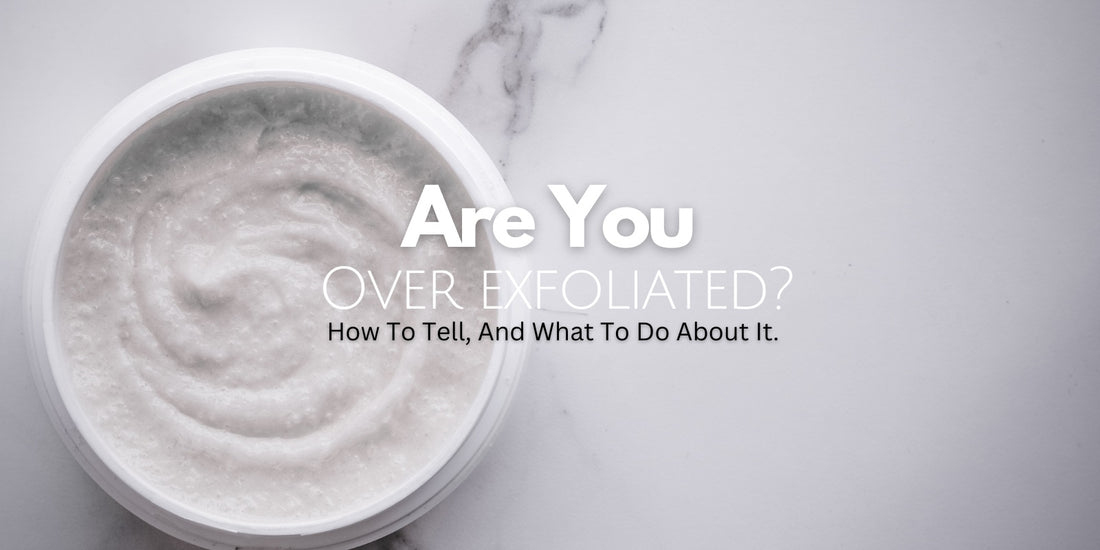Exfoliation is a pivotal element in skincare, contributing to healthy and radiant skin. However, there's a huge difference between effective exfoliation and over-exfoliation. Lets take a look at the various types of exfoliation, the importance of this skincare step, the consequences of overdoing it, and how to heal and prevent over-exfoliation.
Types of Exfoliation
Before delving into the adverse effects of over-exfoliation, it's essential to understand the different methods of exfoliation. Exfoliation can be categorized into physical and chemical methods, both of which have their unique benefits and considerations.
Physical Exfoliation
-
Facial Scrubs: These are common physical exfoliants, containing small abrasive particles such as fine sugar, salt, or microbeads (hopefully non-plastic). Gentle massage with a scrub helps remove dead skin cells. However, avoid scrubs containing things such as apricot, walnut shell, coffee grounds, or pumice type abrasives, which can scratch and damage the skin.
-
Exfoliating Brushes: Designed for facial use, these brushes have soft bristles and provide manual exfoliation. However, excessive pressure or frequent use can lead to over-exfoliation, so moderation is key.
-
Microdermabrasion: Microdermabrasion is a clinical procedure that uses either an abrasive wand or exfoliating powder to remove dead skin cells. This method is effective but should only be administered by a trained professional to prevent over-exfoliation or skin damage.
Chemical Exfoliation
Chemical exfoliation involves the use of various acids, enzymes, or retinol to break down the bonds between dead skin cells. These acids include:
-
Alpha Hydroxy Acids (AHAs): Examples include glycolic acid (derived from sugarcane) and lactic acid (found in milk). AHAs are known for their ability to improve skin texture and reduce the appearance of fine lines. They are excellent choices for those seeking mild chemical exfoliation.
-
Beta Hydroxy Acids (BHAs): Salicylic acid is a common BHA, known for its ability to penetrate oily pores, making it effective in treating acne and blackheads. BHAs are more suitable for individuals with acne-prone or oily skin.
-
Enzymes: Enzyme exfoliants like papain (from papaya) and bromelain (from pineapple) gently dissolve dead skin cells without the need for abrasion. Enzyme exfoliation is an excellent choice for those with sensitive skin, as it's generally milder and less likely to cause over-exfoliation.
-
Retinol (Vitamin A): Retinol is a potent form of chemical exfoliation. It accelerates skin cell turnover, effectively sloughing off dead skin cells and encouraging the production of new, healthy cells. Retinol is a valuable addition to the chemical exfoliation category, known for its ability to combat signs of aging and improve overall skin texture.
Why Exfoliate?
Exfoliation is a crucial step in a well-rounded skincare routine. Here are some of the key reasons why incorporating exfoliation into your regimen is beneficial:
-
Cellular Turnover: Regular exfoliation promotes the natural shedding of dead skin cells, leading to a smoother, more youthful complexion. By encouraging the removal of old, dull cells, new, healthier skin cells can surface, revitalizing your skin's appearance.
-
Unclogging Pores: Exfoliation helps prevent the buildup of oil, dirt, and debris in your pores. By removing these impurities, exfoliation reduces the risk of acne and blackheads, contributing to clearer skin.
-
Improved Absorption: Exfoliated skin is more receptive to the active ingredients in your skincare products. This means that your serums, moisturizers, and other treatments can penetrate more effectively, enhancing their overall performance.
-
Even Skin Tone: Exfoliation can help fade dark spots, hyperpigmentation, and sun damage, leading to a more even skin tone. It's a valuable tool in addressing issues related to uneven pigmentation.
-
Preventing Signs of Aging: By encouraging collagen production and reducing the appearance of fine lines, exfoliation can help combat the signs of aging. As we age, our skin's ability to regenerate itself slows down, making exfoliation even more important for a youthful complexion.
-
Boosting Radiance: Exfoliation can enhance the overall radiance of your skin. A smooth, polished surface reflects light better, giving your skin a healthy, luminous glow.
What Happens When You Over-Exfoliate?
While exfoliation offers numerous benefits, it's crucial to strike a balance. Over-exfoliation can lead to a range of skin issues that counteract the intended benefits. Let's explore the consequences of over-exfoliation in more detail:
Dryness and Flakiness
One of the most common effects of over-exfoliation is excessive dryness and flakiness. When you over-exfoliate, you strip the skin of its natural oils, leaving it parched and in need of moisture. This dryness can manifest as tightness, itching, and flakiness, which are all indicators of a compromised skin barrier.
Increased Sensitivity
Over-exfoliation often results in heightened skin sensitivity. The protective layer of your skin is essential for defending against environmental aggressors and irritants. When you overdo it with exfoliation, this protective barrier becomes weakened, leaving your skin more vulnerable to redness, irritation, and inflammation.
Breakouts
Surprisingly, over-exfoliation can trigger breakouts. When the skin's protective barrier is compromised, it becomes easier for bacteria and irritants to infiltrate, leading to acne and blemishes. This is a counterproductive outcome, as many people turn to exfoliation to address acne concerns.
Redness and Inflammation
Red, inflamed skin is a common sign of over-exfoliation. The skin may appear irritated, itchy, or even develop a burning sensation. This is especially true for individuals with sensitive skin, as they are more prone to over-react when exfoliated too aggressively.
Peeling and Stinging
If your skin begins to peel or sting after exfoliating, it's a clear sign that you've gone too far. These symptoms indicate that the skin's natural healing process has been disrupted. Instead of the desired radiance, you'll be dealing with an uncomfortable and potentially unsightly reaction.
Worsening of Skin Conditions
For individuals with specific skin conditions, such as eczema or rosacea, over-exfoliation can exacerbate these problems. It can disrupt the already delicate balance of these conditions, making them more challenging to manage.
Sun Sensitivity
Over-exfoliated skin is more susceptible to UV damage. Without its natural protective barrier, your skin may burn more easily, and this can accelerate the aging process. Proper sun protection is essential to prevent further damage in such cases.
How to Repair Over-Exfoliated Skin
If you suspect that you've over-exfoliated your skin, there are steps you can take to repair the damage and restore your skin's health.
1. Stop Exfoliating
The first and most crucial step is to discontinue all forms of exfoliation immediately. This includes both physical and chemical exfoliants, including retinol. Give your skin a break to allow it to recover.
2. Gentle Cleansing
Switch to a gentle, hydrating cleanser that doesn't contain any exfoliating agents. A mild, soap-free cleanser is ideal. Cleanse your skin twice daily to remove impurities without further irritation.
3. Hydration is Key
Over-exfoliated skin is often dehydrated. To help restore moisture, use a hydrating serum or moisturizer with ingredients like hyaluronic acid. Look for products that are free of fragrances and harsh additives to minimize the risk of irritation.
4. Sun Protection
Use a broad-spectrum sunscreen with at least SPF 30 every day, even if you're not planning to be in direct sunlight. This is crucial to protect your skin from further damage and to prevent post-inflammatory hyperpigmentation (PIH) that can occur with over-exfoliated skin.
5. Avoid Harsh Ingredients
Refrain from using products that contain alcohol, retinoids, strong exfoliants, or other irritating ingredients until your skin has fully recovered. These substances can exacerbate the irritation and prolong the healing process.
6. Cool Compresses
If your skin is red and inflamed, applying a cool compress can provide relief. Be sure to use a clean, soft cloth and avoid rubbing your skin, as this can further irritate it. Gently pat the compress over your skin to soothe redness and reduce inflammation.
7. Patience
The healing process takes time, and patience is crucial. It may take several weeks for your skin to return to its normal state. During this period, resist the urge to reintroduce exfoliants prematurely.
8. Prevent Future Over-Exfoliation
Once your skin has healed, it's important to adjust your skincare routine to prevent over-exfoliation in the future. Here are some additional tips to help you avoid over-exfoliation in the long term:
9. Follow Guidelines
Always follow the recommended usage guidelines for exfoliating products, including retinol. Generally, more is not better.
10. Listen to Your Skin
Pay attention to your skin's signals. If you experience redness, stinging, or any signs of sensitivity, dial back on exfoliation or discontinue it temporarily. This is especially important when incorporating retinol into your routine, as it can be potent.
11. Know Your Skin Type
Understanding your skin type is essential. Oily, acne-prone skin can generally tolerate more frequent exfoliation, while sensitive or dry skin may require less.
12. Alternate Exfoliation Methods
If you use both physical and chemical exfoliants, consider alternating between them rather than using both in the same routine. This can reduce the risk of overdoing it.
13. Moisturize Adequately
Maintaining proper skin hydration is crucial. Always use a good-quality moisturizer to help protect your skin's barrier and prevent moisture loss.
Exfoliation, including chemical exfoliation with ingredients like retinol, is helpful for maintaining healthy and radiant skin. However, over-exfoliation can lead to a range of issues, including dryness, sensitivity, breakouts, redness, and inflammation. To ensure the best care for your skin, it's crucial to strike a balance and be mindful of your skin's needs.

